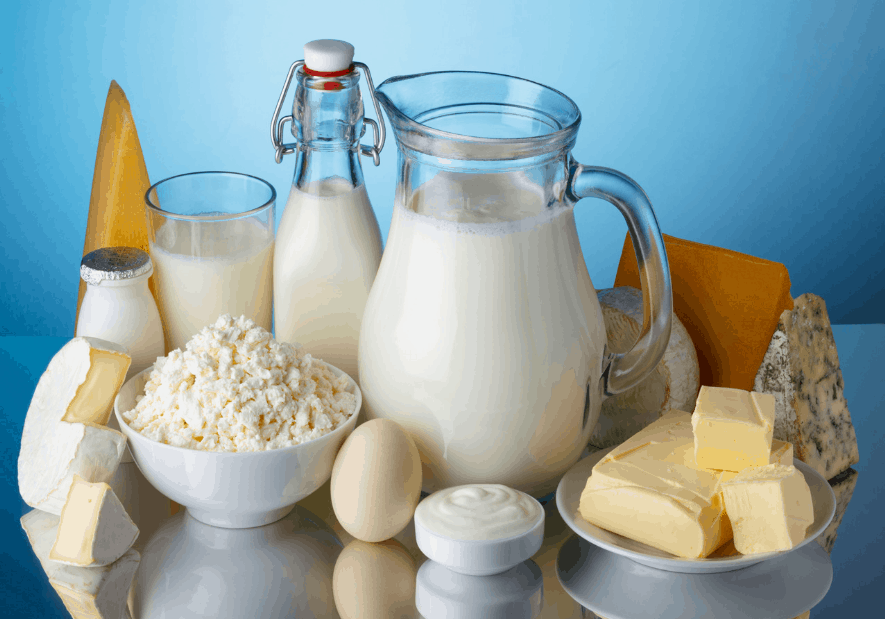We all know the standard marketing pitch right?: “take calcium for strong bones.” But a dilemma that an increasing number of men face is how to keep their bones healthy and strong while at the same time protecting themselves against the possibility of developing prostate cancer.
Calcium is critical for strong, healthy bones, but men who have a high intake of calcium are at greater risk of prostate cancer. Another part of the dilemma is that many high-calcium foods are dairy products, which are also high in protein, and too much protein can further leach calcium from your bones and exacerbate the cycle of bone loss.
Calcium and prostate cancer risk
In September 2008, a research team composed of Gary G. Schwartz, PhD, from Wake Forest University Baptist Medical Center, and Halcyon G. Skinner, PhD, MPH, of the University of Wisconsin, reported that men who had high-normal levels of serum calcium (calcium in their blood) appeared to be at a nearly threefold increased risk for developing fatal prostate cancer when compared with men who had a lower average calcium level (but calcium within the normal range).
Schwartz and Skinner evaluated data from the first NHANES survey (National Health and Nutritional Examination Survey, NHANES I) and from a follow-up NHANES done years later. Their analysis included data from 2,814 men who had their serum calcium levels recorded an average of ten years before some of the study participants developed prostate cancer. In the follow-up survey, the investigators found 85 cases of prostate cancer, which included 25 deaths from the disease. They also discovered that the men with the highest calcium levels were more likely to die of the disease than men who had the lowest levels. Their findings were published in the journal Cancer Epidemiology, Biomarkers & Prevention.
Schwartz and Skinner did not stop there. In several follow-up studies, they reaffirmed their original findings and added the dimension of the role of parathyroid hormone (PTH), noting in the most recent study (November 2009 issue of Cancer Epidemiology, Biomarkers & Prevention) that their “findings support the hypothesis that serum calcium and serum PTH stimulate prostate growth in men without clinical prostate cancer.” Schwartz also commented in a Future Oncology article entitled “Is serum calcium a biomarker of fatal prostate cancer?” that “Increases in extracellular serum calcium causes a decrease in apoptosis [cell death] and an increase in proliferation and migration of metastatic prostate cancer cells.
Thus high levels of calcium in serum may promote the growth of potentially fatal cancer.” (Schwartz 2009)
Schwartz and Skinner are not alone in their investigation of calcium and prostate cancer risk. In a study published in the March 2010 issue of Prostate, the investigators report that they found a twofold increased risk of prostate cancer associated with an increased intake of dairy products. The researchers evaluated 197 cases of prostate cancer and an equal number of controls, all of whom were questioned about their consumption of more than 200 food items. Of all the dairy foods consumed, milk was the only one significantly associated with prostate cancer risk. On a more positive note, the investigators also found a significant trend of decreasing risk for prostate cancer associated with a higher intake of legumes, fish, nuts, and vitamin E. (Raimondi 2010)
That’s a brief look at the calcium and prostate cancer connection. Now let’s examine the protein and calcium story.
Protein and Calcium: An Uneasy Relationship?
More than 20 years ago, a study published in the Journal of Clinical Endocrinology identified a relationship between consuming a protein-rich diet and calcium metabolism, which led the authors to suggest that protein intake caused calcium loss. (Breslau 1988) In 1994, a study published in the American Journal of Clinical Nutrition by Thomas Remer reported that animal proteins can cause calcium to be leached from the bones and excreted in the urine. (Remer 1994) Remer and his colleague Manz again stated their argument in 2003 in the Journal of Nutrition. These and other similar research findings were obviously not welcomed by the meat and dairy industries.
Today, the average American consumes about twice as much protein as he or she actually needs. According to the National Institutes of Health and the American Heart Association, 50 to 60 grams of protein daily is enough for most adults. The body needs only 0.36 grams of protein per pound of body weight. Therefore, the optimum daily protein requirement for a 150 pound individual is 54 grams. However, that does not mean a 300 pound person requires 108 grams, because protein requirement is based on ideal weight, not actual (over)weight. Thus if your ideal weight is 160 yet you tip the scales at 210, your protein requirement is 58 grams, not 76.
High-protein diets, like the Atkins Diet, can help you achieve quick weight loss because it contains a lot of fat along with the protein. Fat makes you feel full faster, so you are less likely to eat as many calories. However, consuming lots of animal protein and fat also results in elevated low-density lipoprotein (LDL) cholesterol levels, which leads to clogged arteries, stroke, and heart disease.
Another consequence of high protein intake, especially from dairy products and meat, is that the metabolism of protein produces uric acid and urea, which is dumped into the bloodstream. In the body’s attempt to get rid of these toxins, it pumps water into the kidneys to produce more urine. This diuretic effect ends up eliminating important minerals from the body, including calcium.
Although the vast majority of calcium resides in bone, the small amount in the bloodstream is critical. The body loses an average of 1.75 milligrams of calcium in urine for every 1 gram increase in animal protein that is consumed. Because the body always strives to keep enough calcium in the bloodstream, when high protein causes the body to lose calcium, the bones give up some of their calcium to make sure the blood has enough. Such “charity” by bones can result in their becoming weak and osteoporotic. Another problem that can arise is that the minerals lost from bone can deposit themselves in the kidneys and form kidney stones.
Eat to protect bone health and prostate health
Compared with animal protein, vegetable protein may actually promote retention of calcium in the body and result in less loss of this essential mineral in the urine. If you replace animal protein with vegetable protein, you reduce your intake of harmful saturated fat and cholesterol, and protect your bone health and prostate health.
To help protect your bone and prostate health even more, make sure you include lots of calcium-rich vegetable foods (some of which are also good sources of protein) as well as good sources of omega-3 fatty acids, too, which are also beneficial for bone and prostate health. Calcium-rich non-animal foods include almonds, blackstrap molasses, bok choy, broccoli, collard greens, fortified rice beverage, hazelnuts, kale, navy beans, seaweeds (nori, kombu, wakame), sesame butter, tapioca, and turnip greens. Salmon and sardines are great sources of calcium, protein, and omega-3 fatty acids.
The bottom line
- Eat only as much protein as you need based on your ideal weight
- Do not exceed the daily requirement for calcium intake, which is 1,000 mg for men and women ages 19 to 50, and 1,200 mg for those older than 50
- Get all or the majority of your calcium from food rather than supplements
- Focus on vegetable sources of calcium and protein, with several servings per week of fish rich in omega-3 fatty acids, such as salmon and sardines
- Get enough vitamin D: 15 to 20 minutes of unprotected exposure to sunlight 3 to 4 times a week is sufficient or take a quality vitamin D supplement
- Participate in regular weight-bearing exercise at least 4 times a week
References
Breslau NA et al. Relationship of animal protein-rich diet to kidney stone formation and calcium metabolism. J Clin Endocrinol Metab 1988 Jan; 66(10: 140-46
Raimondi S et al. Diet and prostate cancer risk with specific focus on dairy products and dietary calcium: a case-control study. Prostate 2010 Mar 15
Remer T, Manz F. Estimation of the renal net acid excretion by adults consuming diets containing variable amounts of protein. Am J Clin Nutr 1994; 59 (6):1356-61
Remer T, Manz F. High meat diet, acid-base status and calcium retention. J Nutrition 2003 Oct; 133:3239
Schwartz GG. Is serum calcium a biomarker of fatal prostate cancer? Future Oncology 2009 Jun; 5(5): 577-80
Skinner HG, Schwartz GG. The relation of serum parathyroid hormone and serum calcium to serum levels of prostate-specific antigen: a population-based study. Cancer Epidemiol Biomarkers Prev 2009 Nov; 18(11): 2869-73
Skinner HG, Schwartz GG. Serum calcium and incident and fatal prostate cancer in the National Health and Nutrition Examination Survey. Cancer Epidemiol Biomarkers Prev 2008 Sep; 17(9): 2302-5







